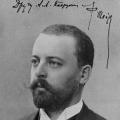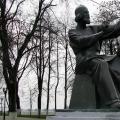
Information for beginners
1. To understand worship, you need to know the psalms
The Psalter is a book of the Old Testament on which all Orthodox worship is actually based. Psalms are used in large quantities in all services. For example, at the beginning of Vespers, Psalm 103 is sung, and at the beginning of Matins, six psalms are read: 3, 37, 62, 87, 102, 142. At liturgy (or at mass), Psalms 102 and 145 are sung. And these are only the most obvious examples.

2. If you buy an edition of the Psalms, everything you need will already be there
There are 150 psalms in the Psalter, and they are divided into 20 groups called kathismas. Each kathisma is divided into three more parts, between which short prayers are inserted. Usually, editions of the Psalter already have all the divisions and the introductory and intermediate prayers are printed, which is convenient. In principle, such publications are easy to Google.

3. You can’t stop in front of a difficult text.
What may not be included in the purchased Psalter are explanations and translations of the text. Psalms are ancient spiritual poetry. Because of the poetic expressions and the special style and rhythm that you need to “get into,” the psalms are initially very difficult to perceive when listening and reading. It is often difficult to understand what a place means in Church Slavonic. You can understand difficult passages with the help of Russian translation or interpretations of the holy fathers. The most famous interpretations are those of Basil the Great, John Chrysostom and Athanasius the Great.

4. You can read the Psalter at home in the same way as it is read in church
The Psalter is read in its entirety at services every week. At Vespers one kathisma is read, and at Matins two kathismas are read. On Saturday evening a new week begins and a new round of reading the Psalms begins, so the first kathisma is always read, and at Sunday matins the second and third kathismas are always read. It turns out that the reading scheme is like this:
Saturday (vespers): kathisma 1
Sunday: 2.3
Monday: 4, 5, 6
Tuesday: 7, 8, 9
Wednesday: 10, 11, 12
Thursday: 13, 14, 15
Friday: 19, 20, 18
Saturday: 16, 17

5. The main thing: The Psalter is a book that is good to pray through
And the holy fathers highly recommend doing this. You can read individual psalms or kathismas at home, adding short prayers at the beginning and between parts of the kathisma, just as they do in church. They are usually already in publications (see point 2).
At first:
Come, let us worship our King God. (Bow)
Come, let us worship and fall down before Christ, our King God. (Bow)
Come, let us bow and fall down to Christ Himself, the King and our God. (Bow)
In the middle:
Hallelujah, hallelujah, hallelujah, glory to You, O God! (3 times).
Lord, have mercy (3 times).
Glory to the Father, and the Son, and the Holy Spirit, now and ever and unto ages of ages. Amen.

You can follow the reading cycle that is completed during the week and read those kathismas that are prescribed on this day of the week: the first two are read in the morning, the third in the evening. Or learn your favorite psalms and remember them throughout the day, following the example of many saints who knew the entire Psalter by heart.

There is also advice to remember individual verses from the psalms for the same purposes.
For example, Ps.117 verses 10-11:
All the nations have gone after me, and in the name of the Lord I have resisted them.
bypassed me, and in the name of the Lord you resisted them
(that is: all the nations, going around, surrounded me, but I resisted them in the name of the Lord)
1. To understand the service, you need to know the psalms. The Psalter is the book of the Old Testament on which all Orthodox worship is actually based. Psalms are used in large quantities in all services. For example, at the beginning of Vespers, Psalm 103 is sung, and at the beginning of Matins, six psalms are read: 3, 37, 62, 87, 102, 142. At liturgy (or at mass), Psalms 102 and 145 are sung. And these are only the most obvious examples.
2. If you buy the edition of the Psalter, everything you need will already be there. The Psalter contains 150 psalms, and they are divided into 20 groups, which are called kathismas. Each kathisma is divided into three more parts, between which short prayers are inserted. Usually, editions of the Psalter already have all the divisions and the introductory and intermediate prayers are printed, which is convenient. In principle, such publications are easy to Google.
3. You must not stop in front of a difficult text. What may not be included in the purchased Psalter are explanations and translations of the text. Psalms are ancient spiritual poetry. Because of the poetic expressions and the special style and rhythm that you need to “get into,” the psalms are initially very difficult to perceive when listening and reading. It is often difficult to understand what a place means in Church Slavonic. You can understand difficult passages with the help of Russian translation or interpretations of the holy fathers. The most famous interpretations are those of Basil the Great, John Chrysostom and Athanasius the Great.
4. You can read the Psalter at home in the same way as it is read in church. The Psalter is read in full at services every week. At Vespers one kathisma is read, and at Matins two kathismas are read. On Saturday evening a new week begins and a new round of reading the Psalter begins, so the first kathisma is always read, and at Sunday matins the second and third kathismas are always read. It turns out that the reading scheme is like this:
Saturday (vespers): kathisma 1 Sunday: 2.3 Monday: 4, 5, 6 Tuesday: 7, 8, 9 Wednesday: 10, 11, 12 Thursday: 13, 14, 15 Friday: 19, 20, 18 Saturday: 16 , 17
5. The main thing: The Psalter is a book from which it is good to pray, and the holy fathers highly recommend doing this. You can read individual psalms or kathismas at home, adding short prayers at the beginning and between parts of the kathisma, just as they do in church. They are usually already in publications (see point 2).
At the beginning: “Come, let us worship our King God. (Bow) Come, let us bow and fall down to Christ, our King God. (Bow) Come, let us bow and fall down to Christ Himself, the King and our God. (Bow) In the middle: “Glory to the Father, and the Son, and the Holy Spirit, now and ever and unto ages of ages. Amen. Hallelujah, hallelujah, hallelujah, glory to You, O God! (3 times). Lord, have mercy (3 times). Glory to the Father, and the Son, and the Holy Spirit, now and ever and unto ages of ages. Amen.
You can follow the reading cycle that is completed during the week and read those kathismas that are prescribed on this day of the week: the first two are read in the morning, the third in the evening. Or learn your favorite psalms and remember them throughout the day, following the example of many saints who knew the entire Psalter by heart.
There is also advice to remember individual verses from the psalms for the same purposes. For example, Ps.117 verses 10-11: All the nations have despised me, and in the name of the Lord I have resisted them, having despised me, and in the name of the Lord I have resisted them (that is, all the nations have gone around and surrounded me, but I have resisted them in the name of the Lord)
‹ Questions for the priest ‹ About the Psalms
About the Psalms
Date: 01/23/2010 at 16:30Father Andrey, hello!
God bless you for your attentive attitude towards us. Your site is the only one of all the Orthodox ones that I have come across where you can get an answer to a question immediately, almost on the same day. How important this is! Thank you! And I have questions about the psalms:
1. On what occasions is Psalm 33 sung in church? Is it necessary to know it by heart and sing it with the choir?
2. What psalms, in addition to the 90th and 50th, do you think should be known by heart and in what cases should they be read?
3. What do they pray for in front of the icon of the Mother of God “Quench my sorrows”?
1. Thank you very much. Must be sung at every liturgy and up to half at the all-night vigil. If other people sing along, then you can too. Yes, you can learn it.
2. You can also learn 142, or any one in general - they are all good. You can look at reading in various cases.
3. They pray in grief, but in all other cases you can pray. Save Christ!
Unfortunately, the faith of many people is limited to the phrases “Lord, help” and “”. Moreover, the utterance of sayings is not always associated with memories of the Almighty. This is very sad. This situation needs to be corrected. After all, without God’s blessing, no business should be started. First, you should study the basic Orthodox prayers, or at least read them from the prayer book until they are memorized.
Three main prayers of Orthodox believers
There are a lot of prayers, and they all have their own classification, some should be read before starting any task, others at the end, there are morning and evening prayers, thanksgiving and repentance, before eating food and as a follow-up to communion. But there are three main prayers that you cannot do without; they are the most important and necessary. They can be read in any situation, regardless of what events occurred. If you suddenly really need to ask for help from the Almighty, but you couldn’t find the right words, then one of the three prayers will be an excellent help.
1. "Our Father." According to the Holy Gospel, this “Our Father” was given by Jesus to his disciples who asked him to teach them prayer. God himself allowed people to call him father and declared the entire human race to be his sons. In this prayer, a Christian finds salvation and receives the grace of God.
2. "Creed". The prayer combines the fundamental dogmas of the Christian faith. Aspects are accepted by believers without requiring proof and repeat the story of how Jesus Christ was incarnated in human form, appeared to the world, was crucified in the name of delivering people from the burden of original sin, and was resurrected on the third day as a symbol of victory over death.

3. Prayer to the Lord Jesus. Addressing Jesus Christ as the Son of God and proving your faith in him as the true God. With this prayer, believers ask the Lord for help and protection.
No matter what happens, at any time of the day or night, remember the name of the Lord your God. Praise his name for every act of God and for the given opportunity to live another bright and joyful day. And having asked something from our Creator, do not forget to subsequently thank our quick helper and intercessor.
Ten Important Prayers for Religious Believers
It is impossible to imagine a pilgrim's day without the Lord's Prayer or the Creed. But there are, although secondary, the same basic Orthodox prayers, from which daytime and evening prayers are made up. People find peace in turning to the Creator. One has only to start reading the prayer book, and life will immediately become simpler and easier. For there is no power more philanthropic and all-forgiving than the pure love of the Lord God.
Before starting prayer, you should learn one more prayer, the initial one (Son of God, prayers for the sake of Your Most Pure Mother and all the saints, have mercy on us. Amen. Glory to Thee, our God, glory to Thee). It is read after the Publican's prayer, but before all the others. In ordinary language, this is a kind of introduction to a dialogue with the Almighty.
Basic Orthodox prayers are the first step on the religious ladder leading along the path to a pious life. Over time, other prayers will be learned. All of them are delightful and beautiful, as they are endowed with great love for God and a great desire to believe, hope, repent, endure, forgive and love.




